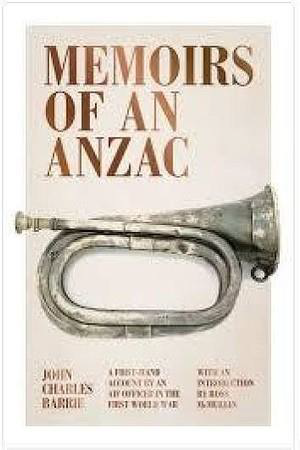J. C. Barrie was a militia officer who went to war as a Lieutenant with the AIF’s 8th Infantry Battalion and served later with 15 Bde. Long after his death in 1957, his granddaughter Judy Osborne recently published these very frank memoirs. They paint a vivid picture of his experiences in combat and also whilst training, on leave, and recuperating from two major wounds. This very interesting book is presented with the assistance of Dr Ross McMullin (biographer of Pompey Elliott, and author of several social histories examining the impact of WW1 upon Australian society). Dr McMullin’s frequent footnotes provide extensively researched support to the tale, by identifying and commenting upon people whom Barrie knew and by explaining the context and significance of events.Barrie writes in a relaxed style and with some humour, although at times he becomes a bit querulous about perceived injustices. He seems to have been an efficient and effective officer, well-liked by his troops.
He landed at Gallipoli on 25 April and was badly wounded by shellfire later that same day. After evacuation and hospitalisation, he worked his way back through the system (often bending the rules to do so) until he re-joined his unit, now on the Western Front, in time for the battle of Pozières. He was at Ypres (near Hill 60) and at Bullecourt before another major wound at the Hindenburg Line in 1917 forced his repatriation to Australia. There Captain Barrie continued serving, as OC at the Point Cook Aust Flying Corps Reinforcements Camp until war’s end. 13 RUSI VIC June 2016
Barrie’s wartime account is full of admiration for the efforts of the troops, describing their practicality, resourcefulness, determination and strong bond of mateship in event after event, both in and out of the trenches.
He did not suffer fools gladly and is quite critical of a few of his colleagues and superiors, whilst nevertheless warmly praising others (including his old militia boss Pompey Elliott). Barrie recalls a few incidents on the Western Front that count against the likes of Brigadier Antill (of Gallipoli infamy). Barrie’s memoirs had deliberately left un-named some others, when recalling fraudulent misuse of the Q system, or officers overdoing the reinforcement camp lifestyle, or a CO being sacked and sent back to Australia. However, these have actually been identified by McMullin’s editing, for good or ill.
Along the way, Barrie offers his thoughts on many topics, from the mysteries of the majestic pyramids, to the attitude of the frontline soldier about the conscription referenda, to discipline problems on troopships and treatment of soldier settlers after the war.
A brief Afterword by his granddaughter explains how Barrie re-adjusted to post-war life as a soldier settler in northern Victoria and later in Melbourne. Dutifully, he continued his military contribution by joining and eventually commanding the militia’s 20th Light Horse Regiment. When WW2 came, he worked as a Colonel with the Volunteer Defence Corps and on the Army Inspection Staff.
This is an interesting and unusually forthright account of a junior infantry officer’s experiences in WW1, painting a vivid picture of life both in and out of the Line.
Reviewed for RUSI by John Boyce, February 2016

Oxford University Press, 2015
Paperback RRP: $32.99
Contact Royal United Services Institute about this article.






